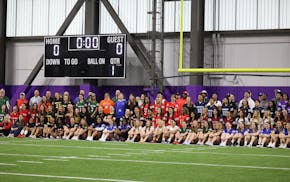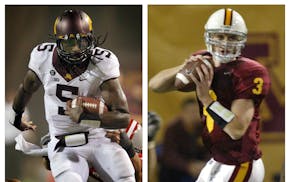If it had been her kid's soccer game in the late June downpour, Andrea Yoch might have been watching from the car. But inside TCO Stadium, more than 4,000 fans still turned up despite heavy rain for Minnesota Aurora FC's 4-1 win over Chicago City.
It was a reminder for Aurora co-founder Yoch that the club had the foundation needed for what's next. Having wrapped up its third preprofessional season in the USL W League, "we weren't the shiny new thing" in town anymore, Yoch said. And yet fans kept turning up.
So where does that leave the Aurora now?
After its 12th season, armed with a new four-year, $240 million media deal, the professional National Women's Soccer League plans to announce its newest expansion club this fall. The already-announced Boston team and the next expansion pick will debut as the league's 15th and 16th teams in 2026.
The Aurora want into the professional league that fields most of the U.S. national team stars and international talent from six continents. Aurora founders are one of two groups, alongside one from Cleveland, that have publicly confirmed bid submissions over the summer. Yoch told the Star Tribune 11 groups filed preliminary bids by the early June deadline. In June, Sports Business Journal reported the two cities, plus Cincinnati, as markets that would submit bids and Atlanta, Denver, Nashville and Jacksonville as "maybe."
Professional expansion, take two
This isn't the first time the Aurora have expressed interest in the NWSL. Minnesota's group had bid for one of two spots in the league's previous round of expansion in 2022. Those spots ultimately went to Boston and the Bay Area for around $50 million each.
"We didn't really have the investors," Yoch said of the first bid, for which she had planned to find investors during the process. "We really spent the intervening time finding those investors. … We've built a lot of relationships. And so there's a lot of things we were able to anticipate that are important this time."
The Aurora group has not publicly stated who those investors are beyond noting some have local sports business experience and some do not, with the intent of "protecting some privacy" in the circumstance they are not awarded the bid, Yoch said. Yoch also stated that should the Aurora be awarded the bid, its 3,080 community owners "come with us."
"They will become a part of our future," Yoch said. "The investors know that, the NWSL knows that."
The investment group cannot be entirely community owners, though. The U.S. Soccer Federation's professional standards require pro clubs to designate a principal owner who owns at least 35% of the team and has a net worth of at least $15 million.
The amount the investment group must raise is not a cut-and-dried numerical hurdle to clear. It is "very much a bid process," Yoch said, "like a live auction."
Interested bidders got a clearer sense of team valuations when the San Diego Wave sold for $120 million in March, then Los Angeles-based Angel City sold for $250 million in July.
When the two new Southern California teams joined the league in 2022, expansion fees were around $2 million. That number would no longer cover some of the league's highest multiyear player contracts.
"Texts go flying" after a sale, Yoch said. "You're watching these numbers, and you hope your investors are going to stick with you as the prices go through the roof.
"Here's the value three months ago. That literally got blown up the moment the San Diego Wave got sold."
Yoch said the team had yet to receive feedback on its initial bid and is still in the "holding pattern."
"Our expansion process is ongoing," a league spokesperson told the Star Tribune. "We are engaged with a significant number of qualified bids and we're excited to announce Team 16 at the appropriate time."
Money talks, but so does history
Besides financial investments, the league's expansion committee considers the strength of potential markets, though NWSL Commissioner Jessica Berman told SportPro in February that "because our country is so large, our decisionmaking filters will be less driven by market and more driven by ownership group and facilities."
That's not to say the Aurora haven't lauded their market as part of their pitch. Yoch emphasized attendance and media coverage of women's sports in the Twin Cities — including championships for the Minnesota Lynx and PWHL Minnesota — and the sold-out Big Ten women's basketball tournament in February. The Aurora's reported average attendance of 5,400 fans is comparable to the NWSL's lowest-attendance team, North Carolina (5,652), and within 1,000 of Houston (6,123). The league's season average heading into its Olympic break was 11,216.
Yoch said this bidding cycle placed emphasis on ownership providing a "dedicated" practice facility for teams. She pointed to the Kansas City Current, which constructed a women's soccer-specific stadium and training complex. The club's investment was rewarded when it was made host of this season's league championship.
Yoch could not publicly provide details on where a Twin Cities pro team would train and play. The Aurora do both at TCO Stadium, the Vikings' practice facility in Eagan. Allianz Field, Minnesota United's stadium in St. Paul, seats 19,400 fans.
"What they want to know is that you actually know how to run a team," Yoch said. "This is not the old days anymore. [A women's team] is not an afterthought."
If the league reveals the 16th team later this year, the chosen group will have 15 to 18 months to finalize branding, hire staff and build a roster before the 2026 season kicks off, likely in March.
If not the NWSL, what next?
As the NWSL sees growth in investors, attendance and viewership, other groups want in on the rising tide of professional women's soccer. The Aurora play now in the USL W League, operated by the United Soccer League. In mid-August, eight teams will kick off the inaugural season of the USL's professional league, the USL Super League.
"We have definitely had conversations" about joining other professional leagues, Yoch said. "Honestly, we didn't feel like we were ready for 2024. We wanted to run Aurora for a few years to make sure that we had a good stable business, and adding a Super League team after only two seasons of existence just felt very overwhelming to all of us."
Serious conversations about other ways to grow will happen if the bid doesn't go through, Yoch said. "That's what's really exciting about where we are right now," she said. "We have options."
Two things are certain, per Yoch: the group has two years remaining in its USL W League deal and a multiyear lease with TCO Stadium, so a preprofessional iteration of the Aurora will compete for at least two more W League seasons.
The Aurora are also taking steps to engage their community outside of the short two-month season, with camps and a potential youth academy. Yoch said several of this year's new camps sold out their 60 slots within an hour. This summer also saw the launch of Aurora 2, a lower-level development team.
"How we continue to grow and how we continue to be relevant, what that looks like, can be a lot of different things," Yoch said. "This group of investors that we have, some of them, I hope, are going to stay with us and help our team grow, and be a part of our future."

Twins find fuel in back-to-back homers, defeat Blue Jays

Players to watch in Minnesota's girls flag football state tournament

Twins lose Matthews to injury; Woods Richardson likely to join rotation

Former Gophers football standouts embrace being basketball dads
